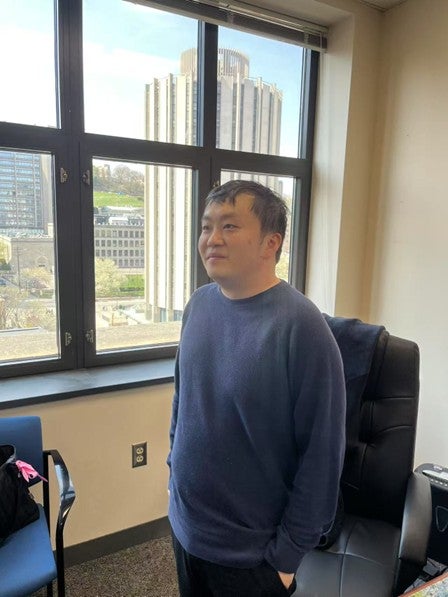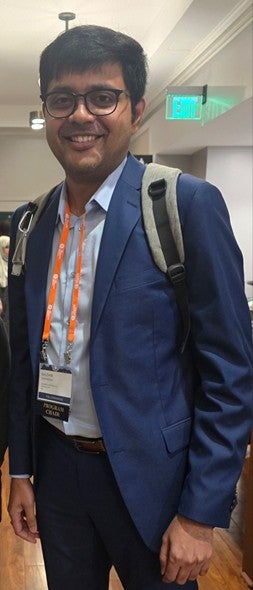May 7, 2025
 Dr. Junyu Liu, a newly appointed assistant professor in the Department of Computer Science (CS) at the University of Pittsburgh School of Computing and Information (SCI), is reimagining how quantum computing is taught for people with a traditional computing background. His course, CS 1613: Introduction to Quantum Computing, is tailored for computer science undergraduate majors and aims to demystify quantum mechanics by connecting it to tangible computing principles and cutting-edge industry tools.
Dr. Junyu Liu, a newly appointed assistant professor in the Department of Computer Science (CS) at the University of Pittsburgh School of Computing and Information (SCI), is reimagining how quantum computing is taught for people with a traditional computing background. His course, CS 1613: Introduction to Quantum Computing, is tailored for computer science undergraduate majors and aims to demystify quantum mechanics by connecting it to tangible computing principles and cutting-edge industry tools.
From the Dotcom Era to Quantum Innovation
Dr. Liu’s journey into quantum computing is rooted in a unique personal history. Born in 1995 into a family of software engineers, Liu witnessed firsthand the dramatic rise—and fall—of the early internet boom. His father, a C++ and Fortran programmer, launched a startup during the tech bubble of the late 1990s, only to see it dissolve in the crash around 2000. Rather than following a conventional software path, Liu was inspired to explore the frontiers of quantum physics, intrigued by how those abstract concepts could one day enhance the digital infrastructure of the modern world.
Fast forward to 2025, Dr. Liu has emerged as a leading voice in the realm of quantum computing. His research spans quantum algorithms, quantum computing systems, quantum communication, and quantum sensing, and he is passionate about making this complex subject accessible to students from a traditional computing background.
“You don’t need a PhD to have some understanding of quantum computing,” Liu emphasizes. “If you’re comfortable with linear algebra, you’re ready to step into this new area by training quantum rules as a new abstraction layer. On the other hand, graduate education is important as well, where CS 2893 (a new course at Pitt for the fall 2025 semester), will be created for that need.”
Making Quantum Computing Practical and Approachable
In CS 1613, Liu uses a pragmatic teaching philosophy: introduce students to quantum concepts through concrete examples rather than dense theoretical exposition. His three main course principles include:
- Start with rules and intuition of quantum computing through hands-on examples.
- Prioritize practical applications, moving beyond pure theory.
- Integrate real-world quantum tools from the industrial ecosystem—like IBM’s Qiskit, Xanadu’s PennyLane Codebook, and especially the open-source platform for hybrid computing: NVIDIA’s CUDA-Q.
Meeting with NVIDIA: Quantum in Action
One of the most exciting developments in the course is its enhancement from NVIDIA. On April 4, 2025, Dr. Monica Van Dieren, Senior Technical Marketing Engineer for Quantum Computing and HPC at NVIDIA, visited the University of Pittsburgh to deliver guest lectures and present real-world challenges as part of the course’s final project.
 These challenges, based on material from the CUDA-Q Academic repository, focused on quantum optimization and quantum walk algorithms for financial applications. Students learned about cutting-edge techniques like circuit knitting for distributed hybrid quantum computing that push the boundaries of what can be done with today’s technology. This marks the second year of such collaboration, following a successful 2024 iteration of the course led by Dr. Kaushik Seshadreesan, an assistant professor in the Department of Informatics and Networked Systems (IS). He will continue to offer an IS version of the course under number INFSCI 1610.
These challenges, based on material from the CUDA-Q Academic repository, focused on quantum optimization and quantum walk algorithms for financial applications. Students learned about cutting-edge techniques like circuit knitting for distributed hybrid quantum computing that push the boundaries of what can be done with today’s technology. This marks the second year of such collaboration, following a successful 2024 iteration of the course led by Dr. Kaushik Seshadreesan, an assistant professor in the Department of Informatics and Networked Systems (IS). He will continue to offer an IS version of the course under number INFSCI 1610.
“Not all developers understand how CPUs or GPUs work internally, yet they still build incredible software,” says Van Dieren. “The same applies to quantum computing—it’s a deeply interdisciplinary space that doesn’t necessarily need a PhD in physics. We need a future workforce that spans software development, architecture, systems, algorithms, and hardware. CUDA-Q is providing the platform to build that workforce.”
Building the Future Quantum Workforce
Feedback from students has been overwhelmingly positive.
“This course is innovative in combining quantum computing abstract concepts with the industrial education ecosystem’” said Hina Sekine, an undergraduate CS student.
By blending academic rigor with industrial relevance, Pitt’s quantum computing course is cultivating a new generation of technologists ready to thrive in the quantum era.
As Dr. Liu puts it, “Quantum computing is not only the future of physics—it’s also the future of computation. And that future is starting right here in our classrooms.”
